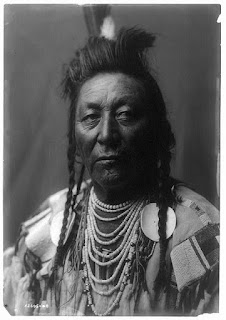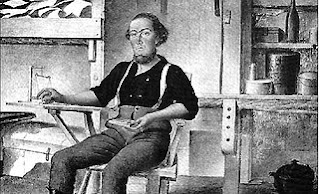Great Leader: Plenty Coup of the Crow, 1848-1932
As Settlers poured onto the western plains and the Army consistently clashed with one tribe after another, Native leaders faced a dilemma. To fight the invaders inevitably meant the loss of men they couldn't replace and eventual deportation to reservations. Cooperation with the Whites might spare their people some of this misery, but could cost a leader prestige among his own people. One who successfully struck that balance was Plenty Coup, Principal Chief of the Crow Nation.
 Plenty Coup, 1848-1932, was born near present-day Billings, Montana. His childhood name was Buffalo Facing the Wind. He gained experience as a young warrior against his people's traditional enemies, such as the Sioux/Lakota and Cheyenne. When still very young, he began to have visions which indicated that, one day, a strange race of people would take over their homeland, destroy the buffalo and replace them with cattle. At first, some of these dreams seemed so farfetched that his family and friends tended to disbelieve him. Only later would they realize how true these premonitions were. His grandfather saw potential in the young man, predicting that one day, he would be a great chief with many war accomplishments. He took on the name Plenty Coup, which was the shorthand English way of saying many war accomplishments. The name referred to the Plains practice of striking an enemy with a coup stick, or county coup, a feat Plenty Coup accomplished many times in his career. However, for a daring young warrior who was rapidly gaining status as a visionary and orator, there were many feats of bravery to be undertaken, and more types of war accomplishment than counting coup. Plenty Coup was known as a scout who could use a wolf or other pelt to disguise himself enough to get close to enemy encampments to gather intelligence.
Plenty Coup, 1848-1932, was born near present-day Billings, Montana. His childhood name was Buffalo Facing the Wind. He gained experience as a young warrior against his people's traditional enemies, such as the Sioux/Lakota and Cheyenne. When still very young, he began to have visions which indicated that, one day, a strange race of people would take over their homeland, destroy the buffalo and replace them with cattle. At first, some of these dreams seemed so farfetched that his family and friends tended to disbelieve him. Only later would they realize how true these premonitions were. His grandfather saw potential in the young man, predicting that one day, he would be a great chief with many war accomplishments. He took on the name Plenty Coup, which was the shorthand English way of saying many war accomplishments. The name referred to the Plains practice of striking an enemy with a coup stick, or county coup, a feat Plenty Coup accomplished many times in his career. However, for a daring young warrior who was rapidly gaining status as a visionary and orator, there were many feats of bravery to be undertaken, and more types of war accomplishment than counting coup. Plenty Coup was known as a scout who could use a wolf or other pelt to disguise himself enough to get close to enemy encampments to gather intelligence.
In time, Plenty Coup became an elite warrior, known as a powerful and wise speaker in tribal councils and in dealing with other tribes. In time, he became band chief of the Mountain Crow, before being named principal chief of the three divisions of the Crow Nation. The Sioux War of 1876 would test his diplomatic skills. The Lakota and Cheyenne were traditional enemies of the Crow. Crow scouts were at Little Bighorn/Greasy Grass and Plenty Coup hoped to stress to White authorities his people's willingness to cooperate in the interests of peace. He made several visits to Washington, advocating for his people to retain their traditional homeland. Although the Crow were forced to cede a great deal of land, they didn't have to move entirely to a new reservation, which spared the people a great deal of sorrow and upheaval.
By the time Plenty Coup died in 1932 at the age of 84, his visions had become a reality. Whites controlled the land where the Crow and other tribes had once roamed freely. The buffalo were nearly gone, replaced by cattle. Trains, great black horses with bellies that touched the ground, crisscrossed the landscape. He was one of the few Native chiefs to write his autobiography, in cooperation with author Frank Bird Linderman. It was published as American: the Life-Story of a Great Indian, Plenty Coup, Chief of the Crow. At his death, his people decided against electing another principal chief, indicating that no one could take his place. When the Tomb of the Unknown Soldier was dedicated in Arlington National Cemetery, Plenty Coup was invited to attend and paid his respects, on warrior to another, by laying his war bonnet and coup stick on the grave. They were later preserved on display.
 Plenty Coup, 1848-1932, was born near present-day Billings, Montana. His childhood name was Buffalo Facing the Wind. He gained experience as a young warrior against his people's traditional enemies, such as the Sioux/Lakota and Cheyenne. When still very young, he began to have visions which indicated that, one day, a strange race of people would take over their homeland, destroy the buffalo and replace them with cattle. At first, some of these dreams seemed so farfetched that his family and friends tended to disbelieve him. Only later would they realize how true these premonitions were. His grandfather saw potential in the young man, predicting that one day, he would be a great chief with many war accomplishments. He took on the name Plenty Coup, which was the shorthand English way of saying many war accomplishments. The name referred to the Plains practice of striking an enemy with a coup stick, or county coup, a feat Plenty Coup accomplished many times in his career. However, for a daring young warrior who was rapidly gaining status as a visionary and orator, there were many feats of bravery to be undertaken, and more types of war accomplishment than counting coup. Plenty Coup was known as a scout who could use a wolf or other pelt to disguise himself enough to get close to enemy encampments to gather intelligence.
Plenty Coup, 1848-1932, was born near present-day Billings, Montana. His childhood name was Buffalo Facing the Wind. He gained experience as a young warrior against his people's traditional enemies, such as the Sioux/Lakota and Cheyenne. When still very young, he began to have visions which indicated that, one day, a strange race of people would take over their homeland, destroy the buffalo and replace them with cattle. At first, some of these dreams seemed so farfetched that his family and friends tended to disbelieve him. Only later would they realize how true these premonitions were. His grandfather saw potential in the young man, predicting that one day, he would be a great chief with many war accomplishments. He took on the name Plenty Coup, which was the shorthand English way of saying many war accomplishments. The name referred to the Plains practice of striking an enemy with a coup stick, or county coup, a feat Plenty Coup accomplished many times in his career. However, for a daring young warrior who was rapidly gaining status as a visionary and orator, there were many feats of bravery to be undertaken, and more types of war accomplishment than counting coup. Plenty Coup was known as a scout who could use a wolf or other pelt to disguise himself enough to get close to enemy encampments to gather intelligence.In time, Plenty Coup became an elite warrior, known as a powerful and wise speaker in tribal councils and in dealing with other tribes. In time, he became band chief of the Mountain Crow, before being named principal chief of the three divisions of the Crow Nation. The Sioux War of 1876 would test his diplomatic skills. The Lakota and Cheyenne were traditional enemies of the Crow. Crow scouts were at Little Bighorn/Greasy Grass and Plenty Coup hoped to stress to White authorities his people's willingness to cooperate in the interests of peace. He made several visits to Washington, advocating for his people to retain their traditional homeland. Although the Crow were forced to cede a great deal of land, they didn't have to move entirely to a new reservation, which spared the people a great deal of sorrow and upheaval.
By the time Plenty Coup died in 1932 at the age of 84, his visions had become a reality. Whites controlled the land where the Crow and other tribes had once roamed freely. The buffalo were nearly gone, replaced by cattle. Trains, great black horses with bellies that touched the ground, crisscrossed the landscape. He was one of the few Native chiefs to write his autobiography, in cooperation with author Frank Bird Linderman. It was published as American: the Life-Story of a Great Indian, Plenty Coup, Chief of the Crow. At his death, his people decided against electing another principal chief, indicating that no one could take his place. When the Tomb of the Unknown Soldier was dedicated in Arlington National Cemetery, Plenty Coup was invited to attend and paid his respects, on warrior to another, by laying his war bonnet and coup stick on the grave. They were later preserved on display.



Comments
Post a Comment